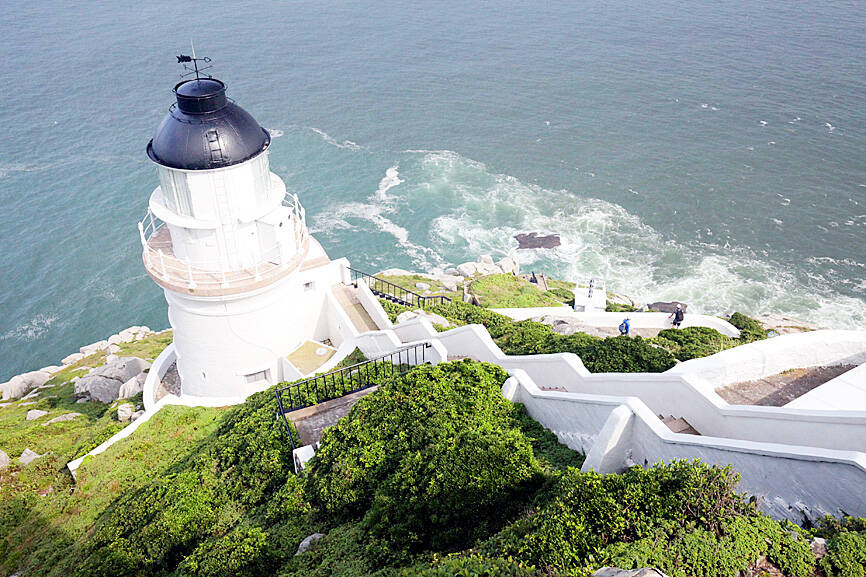China has lifted restrictions on group and independent travel to Lienchiang County for Chinese-controlled Fujian Province residents, a source familiar with the matter said on Thursday.
The Exit-Entry Administration Bureau of Shanghai resumed processing exit visa applications for those traveling to Matsu on Thursday, the source said.
Fujian residents and holders of Fujian residence permits can apply for a single-entry personal or group travel visa to Lienchiang, the source said, adding that the visa is valid for six months and is annotated for direct travel to Lienchiang only.

Photo courtesy of the Maritime and Port Bureau
Tour guides from travel agencies that are authorized to organize tours to Taiwan can apply for a multi-entry group travel visa to Lienchiang, with a validity of up to one year, the source said.
Fujian residents who obtain the correct documentation can enter and exit the Chinese border through Huangqi or Mawei ports in Fuzhou, the source said, adding that they would be able to take cross-strait ferry services under the “small three links.”
Regarding the length of their stay, the source said under Taiwan’s entry policies, Chinese visitors can stay for up to 15 days.
Eight Fujian tourists were to arrive in Matsu yesterday and stay for about five days, Lienchiang County Association of Travel Agents chairman Yang Yao-chih (楊曜誌) said.
The eight tourists were approved by the Chinese authorities to travel to Lienchiang under individual travel visas and no Chinese tour guide would accompany them, but they are to join a guided group during their visit, Yang said.
Chinese tourism to Taiwan had been largely frozen for more than three years. China halted independent travel to Taiwan on Aug. 1, 2019, citing the poor state of cross-strait relations. It then suspended group travel to other countries, including Taiwan, in early 2020, when the COVID-19 pandemic began.
In a written reply, the Mainland Affairs Council said that it was pleased to see the Chinese authorities announce the resumption of applications for Fujian residents to travel to Matsu for group and individual travelers.
“The government’s stance of welcoming Chinese tourists to visit Matsu, Kinmen or Taiwan remains unchanged,” the council added.

Alain Robert, known as the "French Spider-Man," praised Alex Honnold as exceptionally well-prepared after the US climber completed a free solo ascent of Taipei 101 yesterday. Robert said Honnold's ascent of the 508m-tall skyscraper in just more than one-and-a-half hours without using safety ropes or equipment was a remarkable achievement. "This is my life," he said in an interview conducted in French, adding that he liked the feeling of being "on the edge of danger." The 63-year-old Frenchman climbed Taipei 101 using ropes in December 2004, taking about four hours to reach the top. On a one-to-10 scale of difficulty, Robert said Taipei 101

Taiwanese and US defense groups are collaborating to introduce deployable, semi-autonomous manufacturing systems for drones and components in a boost to the nation’s supply chain resilience. Taiwan’s G-Tech Optroelectronics Corp subsidiary GTOC and the US’ Aerkomm Inc on Friday announced an agreement with fellow US-based Firestorm Lab to adopt the latter’s xCell, a technology featuring 3D printers fitted in 6.1m container units. The systems enable aerial platforms and parts to be produced in high volumes from dispersed nodes capable of rapid redeployment, to minimize the risk of enemy strikes and to meet field requirements, they said. Firestorm chief technology officer Ian Muceus said

MORE FALL: An investigation into one of Xi’s key cronies, part of a broader ‘anti-corruption’ drive, indicates that he might have a deep distrust in the military, an expert said China’s latest military purge underscores systemic risks in its shift from collective leadership to sole rule under Chinese President Xi Jinping (習近平), and could disrupt its chain of command and military capabilities, a national security official said yesterday. If decisionmaking within the Chinese Communist Party has become “irrational” under one-man rule, the Taiwan Strait and the regional situation must be approached with extreme caution, given unforeseen risks, they added. The anonymous official made the remarks as China’s Central Military Commission Vice Chairman Zhang Youxia (張又俠) and Joint Staff Department Chief of Staff Liu Zhenli (劉振立) were reportedly being investigated for suspected “serious

Nipah virus infection is to be officially listed as a category 5 notifiable infectious disease in Taiwan in March, while clinical treatment guidelines are being formulated, the Centers for Disease Control (CDC) said yesterday. With Nipah infections being reported in other countries and considering its relatively high fatality rate, the centers on Jan. 16 announced that it would be listed as a notifiable infectious disease to bolster the nation’s systematic early warning system and increase public awareness, the CDC said. Bangladesh reported four fatal cases last year in separate districts, with three linked to raw date palm sap consumption, CDC Epidemic Intelligence